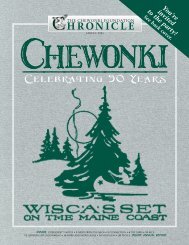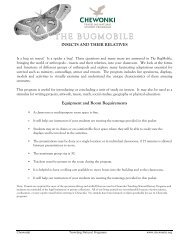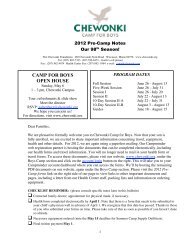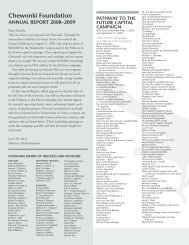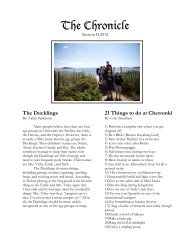Celebrating40Years in the Outdoor Classroom - The Chewonki ...
Celebrating40Years in the Outdoor Classroom - The Chewonki ...
Celebrating40Years in the Outdoor Classroom - The Chewonki ...
You also want an ePaper? Increase the reach of your titles
YUMPU automatically turns print PDFs into web optimized ePapers that Google loves.
On My M<strong>in</strong>d<br />
Turtle Seasons<br />
Lynne Flaccus<br />
Almost everyone at <strong>Chewonki</strong> knows I<br />
have a passion for turtles. Greg and Kyle<br />
would call it an obsession. I am simply<br />
amazed by turtles—<strong>the</strong>ir beauty and<br />
<strong>the</strong>ir evolutionary history.<br />
Each of us marks <strong>the</strong> seasons <strong>in</strong> our<br />
own way, and my seasons are remembered<br />
and marked by turtles. In spr<strong>in</strong>g I<br />
look forward to ice-out and <strong>the</strong> first<br />
warm<strong>in</strong>g rays of sun, when <strong>the</strong> tempera-<br />
Manage Your Household Waste<br />
RUTH POLAND, SCIENCE AND<br />
SUSTAINABILITY FELLOW<br />
“Reduce, reuse, recycle”—it’s been <strong>the</strong><br />
mantra of <strong>the</strong> Green Movement ever s<strong>in</strong>ce<br />
<strong>the</strong> first Earth Day <strong>in</strong> 1970. While <strong>the</strong>re is<br />
much to celebrate about recycl<strong>in</strong>g,<br />
garbage generation is still ris<strong>in</strong>g. Today<br />
<strong>the</strong> average American generates 4.6<br />
pounds of trash daily, up from 3.25 <strong>in</strong><br />
1970. This translates to 251 million tons of<br />
garbage a year. Manag<strong>in</strong>g this volume<br />
raises a host of issues, <strong>in</strong>clud<strong>in</strong>g greenhouse<br />
gas production, pollution, land use,<br />
social and environmental justice, and<br />
exploitation of natural resources to<br />
replace <strong>the</strong> th<strong>in</strong>gs we throw away.<br />
To make matters worse, much of our<br />
garbage doesn’t even make it to landfills,<br />
lead<strong>in</strong>g to environmental calamities such<br />
as <strong>the</strong> Great Pacific Garbage Patch: a<br />
swath of ocean twice as large as Texas<br />
GREG SHUTE<br />
tures rise enough that <strong>the</strong> wood turtles<br />
emerge; April is <strong>the</strong> best time to f<strong>in</strong>d<br />
<strong>the</strong>m, before riparian vegetation<br />
provides cover. <strong>The</strong> pa<strong>in</strong>ted turtles<br />
appear later, and about <strong>the</strong> time <strong>the</strong><br />
snapp<strong>in</strong>g turtles also emerge. <strong>The</strong><br />
pa<strong>in</strong>ted turtles, with <strong>the</strong>ir black shells<br />
sh<strong>in</strong><strong>in</strong>g and tw<strong>in</strong>kl<strong>in</strong>g <strong>in</strong> <strong>the</strong> late<br />
morn<strong>in</strong>g sun, bask on logs and rocks.<br />
Though easy to spot from a distance,<br />
<strong>the</strong>y are wary this early.<br />
June br<strong>in</strong>gs nest<strong>in</strong>g season for<br />
Ma<strong>in</strong>e’s turtles and means more turtles<br />
cross<strong>in</strong>g roads and wander<strong>in</strong>g <strong>in</strong> search<br />
of nest sites. When I’m travel<strong>in</strong>g, my<br />
eyes are glued to <strong>the</strong> roads so I can stop<br />
and help turtles cross to <strong>the</strong> o<strong>the</strong>r side<br />
safely. One June day travel<strong>in</strong>g down<br />
Route 1 with Kyle and a friend of his, I<br />
pulled over and did a U-turn to go back<br />
and rescue a turtle. Much to Kyle’s<br />
embarrassment, <strong>the</strong> turtle turned out to<br />
be a bagel. In my m<strong>in</strong>d, everyth<strong>in</strong>g on<br />
<strong>the</strong> road <strong>in</strong> June is a turtle <strong>in</strong> need of<br />
help!<br />
Summers are marked by explorations<br />
through long grass and alders along<br />
riverbanks, or canoe<strong>in</strong>g quiet pond<br />
coves. A perfect day off is one spent<br />
“turtle hunt<strong>in</strong>g.” Just to look for, hold,<br />
and admire a turtle, and <strong>the</strong>n release it, is<br />
one of my favorite th<strong>in</strong>gs to do. This<br />
FOR SUSTAINABILITY<br />
that’s filled with float<strong>in</strong>g plastic (listen to<br />
Charles Moore’s talk at www.ted.com).<br />
So what can we do to improve? First,<br />
we need to educate ourselves and o<strong>the</strong>rs.<br />
Some great resources <strong>in</strong>clude two short<br />
films: Isla de las Floras (a Brazilian film<br />
with subtitles) and <strong>The</strong> Story of Stuff<br />
(available at www.storyofstuff.com). For<br />
some <strong>in</strong>credible visuals, check out<br />
www.chrisjordan.com and click on his<br />
artwork “Intolerable Beauty.”<br />
Second, we can throw away less. You<br />
can reduce your garbage generation by<br />
practic<strong>in</strong>g <strong>the</strong> follow<strong>in</strong>g:<br />
Compost—Biodegradable goods<br />
represent over 50 percent of our garbage!<br />
See www.composters.com for tips on how<br />
to get your pile started.<br />
Recycle—Call your local recycl<strong>in</strong>g or<br />
redemption center to f<strong>in</strong>d out what <strong>the</strong>y<br />
process. Visit www.obviously.com/recycle<br />
for more general <strong>in</strong>fo.<br />
Reduce—Buy items with m<strong>in</strong>imal<br />
packag<strong>in</strong>g. Unnecessary packag<strong>in</strong>g of<br />
food and o<strong>the</strong>r goods is a major cause of<br />
<strong>in</strong>creased garbage production <strong>in</strong> recent<br />
decades. Write to companies that use<br />
year was marked by four turtles that<br />
were each miss<strong>in</strong>g feet or legs, all healed<br />
and healthy. Sometimes <strong>the</strong>se<br />
appendages are eaten by raccoons or<br />
otters, but as long as <strong>the</strong> turtles don’t<br />
lose too much tissue, <strong>the</strong>y manage to<br />
heal and move on. Each turtle I f<strong>in</strong>d tells<br />
a story, even if I can’t read all of it.<br />
When fall arrives I once aga<strong>in</strong> watch<br />
<strong>the</strong> roads for those turtles wander<strong>in</strong>g<br />
back to <strong>the</strong>ir w<strong>in</strong>ter hibernacula, or<br />
young turtles that may be hatch<strong>in</strong>g late<br />
<strong>in</strong> <strong>the</strong> season. <strong>The</strong>re are always a few<br />
warm fall days when turtles take<br />
advantage of <strong>the</strong> low hang<strong>in</strong>g sun to<br />
warm and feed before <strong>the</strong>ir long w<strong>in</strong>ter<br />
under <strong>the</strong> ice. A warm November day<br />
has not stopped me from jump<strong>in</strong>g <strong>in</strong>to<br />
<strong>the</strong> icy water to check out a bask<strong>in</strong>g<br />
musk turtle—a brisk swim for <strong>the</strong> reward<br />
of handl<strong>in</strong>g a usually secretive turtle.<br />
In ano<strong>the</strong>r month or so, I will see<br />
turtles only <strong>in</strong> books and <strong>in</strong> my dreams<br />
until next April. Maybe one day I will<br />
learn from <strong>the</strong> turtles how to appreciate<br />
<strong>the</strong> warm sunny days at a turtle’s pace<br />
and perspective.<br />
Lynne Flaccus is <strong>Chewonki</strong>’s head naturalist.<br />
She lives <strong>in</strong> Alna, Ma<strong>in</strong>e, with her husband,<br />
Wilderness Programs director Greg Shute,<br />
and <strong>the</strong>ir son, Kyle.<br />
HOUSEHOLD WASTE<br />
excess packag<strong>in</strong>g and let <strong>the</strong>m know your<br />
thoughts; <strong>the</strong>y provide this packag<strong>in</strong>g<br />
because <strong>the</strong>y th<strong>in</strong>k consumers want it.<br />
Reuse—<strong>The</strong> little th<strong>in</strong>gs count. Br<strong>in</strong>g<br />
reusable bags to <strong>the</strong> store, get clo<strong>the</strong>s<br />
and furniture at thrift stores or have swap<br />
parties with friends, and close <strong>the</strong><br />
recycl<strong>in</strong>g loop by buy<strong>in</strong>g recycled goods<br />
whenever possible.<br />
For more tips and <strong>in</strong>fo on <strong>the</strong> 3Rs, visit<br />
www.epa.gov/epawaste/conserve.<br />
F<strong>in</strong>ally, we can get <strong>in</strong>volved <strong>in</strong> town<br />
and government policy to address <strong>the</strong><br />
issue us<strong>in</strong>g a top-down approach. Look<br />
for opportunities to <strong>in</strong>centivize better<br />
waste management, such as support<strong>in</strong>g<br />
“pay as you throw” programs, <strong>in</strong> which<br />
communities charge for garbage bags or<br />
waste removal. <strong>The</strong>se programs provide<br />
f<strong>in</strong>ancial <strong>in</strong>centive to decrease your<br />
volume of household trash.<br />
<strong>The</strong> bottom l<strong>in</strong>e: Decreas<strong>in</strong>g <strong>the</strong> amount<br />
of landfill-bound garbage you produce is<br />
one of <strong>the</strong> best th<strong>in</strong>gs you can do to<br />
reduce your personal environmental<br />
impact.



